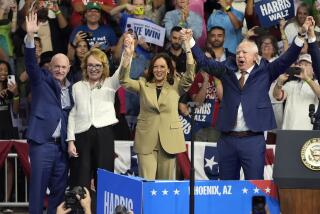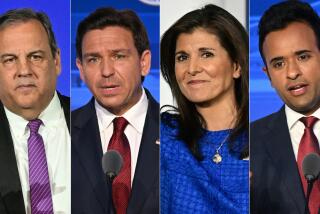Anti-Buchanan Rhetoric Sets Off Tremors in GOP
- Share via
TEMPE, Ariz. — The stakes in the Republican presidential campaign grew ever bigger on Thursday: enough to cast a cloud over the unity of the party itself and the GOP’s treasured revolution in Congress.
As all the major candidates but Sen. Bob Dole of Kansas gathered here for a debate in which they clashed over trade policy while competing over who could be tougher on illegal immigration, the Republican contest had begun vibrating so violently as to shake the party to its foundations.
With the GOP establishment growing more worried about the wildfire candidacy of Patrick J. Buchanan, Dole and dark-horse candidate Sen. Richard G. Lugar said Buchanan’s candidacy would risk the Republicans’ hard-won control of Congress.
“I’ll tell you, with a Buchanan candidacy, we’d be lucky to hold on and keep our majority in the House and the Senate and the state legislators and courthouses and anyplace else,” Dole said in Colorado.
Buchanan answered back ominously. He was tired of the pile-on intensity of the attacks, he said, warning that he and his voters, no longer taken lightly, cannot be taken for granted.
“I’ve always supported the Republican nominee, but I tell you, the name-calling is making it very difficult for my people and my movement to support someone who’s called me a lot of names,” Buchanan said.
Conservative leaders, meanwhile, expressed their own worries--that establishment alarm over Buchanan was drifting dangerously close to an all-out attack on the bedrock right.
“Quit attacking him and calling him names,” said Ralph Reed, the head of the Christian Coalition. Such complaints from conservatives have been a major topic at the Conservative Political Action Conference--an annual gathering of conservative leaders--which continues today in Washington.
Perhaps in response to such complaints, Dole strategists said they were ratcheting down their anti-Buchanan rhetoric and eliminating the word “extremist” from their campaign lexicon.
“It was effective to use the day after the New Hampshire primary,” said Dole campaign manager Scott Reed. “I don’t think it’s necessary to use now. We’ve made our point.”
At a late-night press conference in Portland, Ore., Dole insisted that he, personally, had never called Buchanan an “extremist,” but added that he would continue to say he has “extreme views.”
The Thursday night debate once again displayed how Buchanan’s agenda has come to dominate the GOP campaign. He, Lamar Alexander, Steve Forbes and Rep. Robert K. Dornan of Garden Grove spent much of the 90-minute forum jousting on trade and immigration--issues that Buchanan has advanced.
The conservative commentator defiantly described his would-be trade meetings with foreign leaders on trade issues, singling out China and its high tariff on American goods as a target of a Buchanan administration.
“Dealing with England is one thing,” he said. “I would sit down with communist China . . . and say this may be a good deal for you but it is not for me. . . . Besides that, we don’t like the way you treat dissidents and the way you treat women so we are not going to treat you the same way we treat a democratic republic because you are a brutal dictatorship. . . .”
His two main debate rivals attacked Buchanan’s trade policies.
“Buchananism says that to create jobs, we build a wall around the country,” said Alexander. “I say to create jobs, we lower taxes, lower regulations and focus on education.”
Forbes, who appeared to use the debate effectively to pose a contrast with the other two, made a strong defense of free trade. “Protectionism always fails. It gave us the Great Depression,” he said.
Illegal immigration also drew a sharp contrast among the candidates. Buchanan, reiterating his plan to erect a security fence along parts of the border with Mexico, declared that “within six months, I will stop illegal immigration coming into this country cold.”
Alexander called for establishing a new branch of the armed services to police the border. “The reason we should do that is because our failure to deal with illegal immigration is poisoning our attitude toward legal immigrants,” he said.
But Forbes derided Alexander’s proposal as “another agency, another government program.”
Alexander was frequently heckled. During his closing statement, he appeared rattled. Afterward, he conceded to reporters: “Mr. Buchanan and Mr. Forbes did a very good job of bringing their supporters here.”
Others offered a rougher assessment that may indicate trouble for Alexander’s hope of gaining strength from a head-to-head confrontation with Buchanan. Alexander “was weak. His voice was weak, and his arguments were weak,” said Rep. John Shadegg (R-Ariz.), who is uncommitted.
Earlier, the peripatetic Buchanan, came face to face with angry voters.
Arriving in Tucson, Buchanan rode in a parade aboard a covered wagon, wearing a black cowboy hat. But while some cheered, a largely Latino crowd jeered.
“Deport Buchanan!” some shouted. And, “Go, Pat! Go Home!”
“It was a tremendous outpouring of love and affection,” Buchanan joked later. He added that this kind of reaction was predictable. “Listen, I’m a controversial figure. We can confront it. . . . I’m not an insecure man. I know folks are frightened of me because I’m doing so well.”
As for his choice of hats, Buchanan laughed and said: “The good guys always wore the black hats in the movies I went to.”
Alexander, as a stock car racer might, sought to vault himself forward using the slipstream created behind the Buchanan and Dole campaigns.
Referring to Dole’s decision to skip the Arizona debate, Alexander charged that the Senate majority leader “is ducking . . . a contest of ideas.”
Dole shrugged off the critics. “We don’t let other people determine our schedule,” he said. “. . . I debate every day in the Senate.”
An aide said the struggling and supposed front-runner preferred “to be seen in some of the other primary states.”
Several factors may explain Dole’s decision to skip the debate despite pleas from local supporters that he attend. As Dole himself said, Arizona is “a state that’s bound to be very hard,” and Dole aides may hope that avoiding the debate will allow them to explain away a bad showing if they lose Tuesday’s primary there.
In addition, some advisors close to the Dole campaign suggested that while the senator had been tempted to change his schedule and appear, he was concerned that after ruling it out weeks ago, a sudden change now would be seen as a sign of panic.
In the meantime, Dole relied on surrogates, including a coalition of Arizona business and state officials who held a press conference to say that the North American Free Trade Agreement, contrary to Buchanan’s assertions, has generated thousands of jobs. The group said Mexico is Arizona’s largest trading partner, representing about $2.4 billion in business last year--a 34% increase since 1990.
Dole himself, staccato-fashion, continued through the day to emphasize his differences with Buchanan: “If you want to polarize America, I’m not your candidate.” And, “I’m not a radical person, I’m a mainstream conservative.” And, “I may not be a good talk show host, but I’m a leader.”
In the blur that has become the GOP campaign, Arizona votes Tuesday along with North and South Dakota. South Carolina follows March 2. Twenty-three more states vote later in the month, leading to California’s primary March 26.
“This is going to be a roller-coaster ride for the next few weeks,” said Alexander, who has predicted Florida’s March 12 vote will be “the decisive primary.”
For a political party that rode high not so very long ago, the rough-and-tumble of February has led to a first-class case of jitters.
But despite the Washington GOP establishment’s much-ballyhooed determination to pressure mainstream candidates to rally around Dole, nobody was yielding.
Even Lugar, whose campaign has never caught on, held a press conference to say he was staying in the race to concentrate on five New England primaries March 5.
“Don’t call,” he said to party leaders who might be tempted to ask him to step aside in favor of Dole. The decision seemed to disappoint Dole, who said, “If one of us got out, the other would get more votes.”
Forbes likewise said he was not only staying in, but stepping up his campaign, naming former U.S. Sen. Malcom Wallop of Wyoming as chairman to “develop a coherent long-term strategy.”
“My friends have urged me to stay on and that’s what I’m doing,” he added, vowing to match or surpass Dole in spending. After Thursday’s debate, Forbes was to return to Delaware, which votes on Saturday.
Times staff writers Stephen Braun, Ed Chen, and Bob Sipchen contributed to this story. It was written by staff writer John Balzar.
More to Read
Get the L.A. Times Politics newsletter
Deeply reported insights into legislation, politics and policy from Sacramento, Washington and beyond. In your inbox twice per week.
You may occasionally receive promotional content from the Los Angeles Times.










